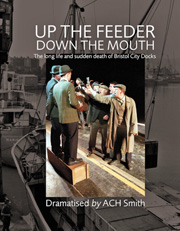
Up the Feeder, Down the Mouth
A play about Bristol docks
ISBN 978-1-908326-12-6
About this book | Reviews | Read excerpts | How to buy this book
From The Bristol Review of Books, Issue 19, Winter 2011.
Download full article here.
In 1996 Andy Hay, then director of the Bristol Old Vic, commissioned me to write a play about Bristol docks, in the researched documentary vein of a play about the Great Western Railway I had written for the Bristol Old Vic some years earlier. It would take account of the thousand-year history of the docks, but would focus on the industrial experience of dockers still living. Like a Bristolian Studs Terkel, I listened to about 50 old dockers and their wives and a few seamen, and wound up with a hundred close-typed pages of material, about five times as much as an evening on stage would need. The job, then, was selection, and shaping. People might think it an easy way to write a play, to base it on documentary material. It is not. Often I longed for the licence just to write a scene out of my head. Some linking parts were like that, but most of the scenes had to respect the human experience of the source. Even some of the songs arose from the research. An old seaman said to me, 'Prince Street, look at it now, what have you got?', and those words open the closing number. Hay drove me through nine drafts on the first production of 'Up the Feeder, Down the Mouth', in the Theatre Royal, and four more on the 2001 revival, not to mention on-the-wing tweaks in the course of rehearsals.
In the Theatre Royal in 1997 we had a professional cast of 11, plus five musicians, and 34 extras as dockers and chorus. The extras had their own director, Mike Shepherd of Kneehigh. Over the three-week run we filled about 70 percent capacity, with full houses in the last week. There were up to six curtain calls, and enthusiastic reviews. Many in the audience had seldom or never been to a theatre. They shouted out, ignoring the shushing. It was, of course, in recognition of the way of life they had known when there were still working ships in the heart of Bristol. Every night elderly men were in tears. Liverpool dockers on strike came down, and told us that they recognised every docking dodge and slang phrase.
Four years later, Hay decided to revive the play, 'but this time we'll do it on the docks itself.' The revival was to be staged on Prince's Wharf, with the keen collaboration of the Industrial Museum. It would be a much larger show, with a very big real ship docking, and cranes and a shunting engine and a van performing. We needed to introduce new material. John O'Hara, the musical director, called me in to hear a canon he had written. 'I've always wanted to write a canon.' I liked it, and told him I'd often complained that it was the writer who had to do the stone-breaking work, finding a song's form and rhythms, making things easy for the composer. I would enjoy doing it this way round. I began to feel less easy, however, when we agreed it had to fit into a sequence where our cast of extras were unloading bananas from the ship. I was not brimming over with witty lines about unloading bananas. At home, I had more trouble writing those words, to fit O'Hara's canon, than any other song I've done. I never got them quite right, and would have a fresh go if there were another revival.
The revival booked out its entire run before the opening night. The Theatre Royal production had primed demand, and local television news got interested. Sarah Smith, the Bristol Old Vic general manager, told me it was just as well we sold every one of 8000 seats, because staging the show had cost so much that 70 percent, good going normally, would have left the company on its uppers. To this day people tell me how much they enjoyed it, or how cheesed-off they were at not getting in.
People from the National Theatre came to see the show but it was too site-specific (and, I suspect, too Bristol-specific) for them to consider a transfer, even though, I pointed out, they have got a river outside their place. So many people had been turned away at the box-office that the Bristol Old Vic were debating whether they should put it on again in 2002..
Reviews
The two productions of Up the Feeder, Down the 'Mouth played to 20,000 people.
Something magical.... It's an unforgettable experience for those lucky enough to see it.
— The Daily Telegraph
... powerful documentary... a feat of storytelling...
— The Observer
... a terrific show... an overwhelmingly emotional depth charge in Princes Wharf.
— Sunday Independent
... beautifully written script... This is theatre that matters.
— The Guardian
... the single most magical moment of the year.
— The Observer, at the end of 2001, reviewing the year in the British theatre
... A funny and startlingly encyclopaedic record of the life of the Bristol docks...
the perfect anthem for a city on the crest of an unstoppable revival... truly magical moments.
— The Independent
Excerpts from Up the Feeder, Down the 'Mouth
The Bristol Review of Books article contains two excerpts; download the article here.
How to buy this book
Up the Feeder, Down the 'Mouth was republished in an illustrated edition in March 2012 by the Redcliffe Press. To order a copy, contact www.redcliffepress.co.uk.
